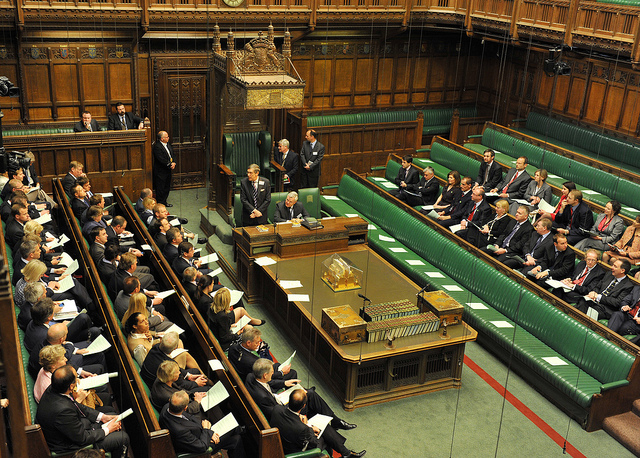Prime Minister’s Questions underpins an expectation that politics is an activity best performed by men
Prime Ministers Questions has been under the microscope of late, with the Hansard Society publishing a report which shows in some depth how little the public think of its rambunctious and partisan nature. Joni Lovenduski argues that the weekly ritual reinforces male stereotypes of leadership, and in doing so creates barriers to female political leadership.
PMQs are a prominent feature of political news routinely reported by journalists. They are a recurring topic in parliamentary sketches and Wednesday news bulletins. The reports offer some largely unchallenged received wisdom. We are told that PMQs are a ‘Punch and Judy’ show, a gladiatorial contest between party leaders who falter at their peril. Their adversarial nature bears responsibility for putting the public off politics but it is a loved and necessary part of the theatre of British politics. Simon Hoggart described it as:
“The most famous parliamentary session anywhere in the world. In Britain it is both reviled and relished. The present Speaker, John Bercow, knows that for the most part the public dislikes the schoolboy rowdyism and tries periodically to quieten things down. He rarely succeeds for long.”
Bercow’s reported views are shared by women MPs and feminist observers of parliament who contend that the occasion is particularly off-putting to women, so much so that they explain women’s relatively lower levels of interest in politics and also their reluctance to become parliamentarians. There is plenty of evidence that the institution encourages sexism. For example the ‘calm down dear’ and Nadine Dorries ‘frustrated’ comments for which Cameron apologised, the Kenneth Clarke rape comment controversy, the recent row about efforts to cancel the international women’s day debate (disapproved of by some commentators as a ritual debate) and the fall in the numbers of women in government and cabinet positions may be an indicator of recidivism. The press are unrepentantly sexist. As recently as April 2011, The Telegraph ran a ‘whose boobs are these?’ item using photos of a woman MP sitting behind Ed Miliband during PMQs.
I was interested in the claim that PMQs put women off politics so I commissioned a YouGov survey that explored public attitudes to it in 2010. I was surprised to find that not only were women and men generally positive to PMQs, women were slightly more positive than men. The survey research was not designed to pick up ambivalences and ambiguities in public attitudes. This is the terrain of qualitative work such as interviews and focus groups. Hence the recent Hansard Society research showing that the public are put off by some aspects of PMQ was focus group based.
My research found a discrepancy between voters and MPs (who had been interviewed and then surveyed about their attitudes to PMQs.) Among voters women are, if anything, more positive about PMQs than men while women MPs are less so. This is puzzling, though some of it can be explained. The differences in attitudes of women MPs and women in the public may result from their different experiences of PMQs. The public see only the relatively more exciting (!) version of it that appears on TV.
Overall, it is in the ritualised aspects of PMQs that we find institutionalised masculinity. The standards of good performance at PMQs were designed by and are best suited to particular kinds of male political actor. Women MPs say they would prefer substantive political discussions to confrontational argument a view that may well be shared by their male colleagues. However there is little about PMQs that reflects this. Its performance standard is one saturated with ideals of traditional masculinity and is difficult for most women and some men to emulate. The performance standards, which are reinforced by party competition, are compelling. Most members concede that the competitive aspects of the performance socialise MPs, help to bind party groups and maintain backbench morale.
However, it also helps to embed and continue a logic of appropriateness that is not inclusive and may not be supported even by the actors who abide by them. One example of the effects of PMQs on performers is PM David Cameron’s widely criticised remarks to Nadine Dorries during PMQs. In an interview with Andrew Marr of the BBC, Cameron blamed the aggressive and confrontational atmosphere of the occasion for his remarks which he said ‘came out wrong’ and ‘caused the wrong impression…’. Cameron then underlined how PMQs norms affected his behaviour, saying ‘It’s not what I’m like, that’s not who I am’. Similarly, when asked about her widely publicised conventionally adversarial performance opposite William Hague when taking PMQs on 8 July 2009, Harriet Harman stated that she had no choice but to follow the conventions when she took PMQs because she knew that was what her party wanted. ‘I had to do it that way’ she said. Such examples indicate a very high level of awareness by individual actors of how embedded norms affect their own behaviour.
PMQs are a rule governed activity that supports a paradigm of politics which is internalised by MPs and accepted and internalised by the public. The ritual sustains the traditional masculine culture by continually repeating performances of adversarial confrontation. Performance is evaluated in terms of competitive success framed in the way that the discourse of sporting competitions, races or wars are framed. (Did David Cameron win over Ed Miliband during PMQs today?) Commentary, if often amusing and erudite, is rarely framed in terms of the contribution to policy made in the contributions to the debate. But for the public this is the best known of all of parliament’s activities, and likely its main notion of the functioning of parliamentary accountability. Generally the public thinks that PMQs are functional and their belief that parliament should hold government to account explains why. However this may be because it is all they know. Even if the practice is symbolic and ritualistic, sometimes to a ridiculous degree, if it is a means, perhaps the only means of securing accountability, it will be valued.
While PMQs undoubtedly contribute to the accountability of government to parliament, the ritual offers a model of behaviour in the political arena that affects not only how citizens and actors see politics but also how they see themselves. In short, PMQs performance accords to a logic of public masculinity that is accepted by both women and men voters. This is a barrier to women MPs and would-be politicians because it underpins an expectation that politics is an activity best performed by men. Some women MPs and many feminist observers of politics believe that PMQs performance requirements are a paradigmatic example of the type of posturing and strutting that puts women off politics and stops them from wanting to be politicians. At present good evidence that would enable fuller assessment of this important claim is not available.
—
Note: this post originally appeared on the PSA blog and can be found here. It represents the views of the author and not those of Democratic Audit or the LSE. Please read our comments policy before posting. The shortened URL for this post is: https://buff.ly/1lO8mr1
—
 Joni Lovenduski is Anniversary Professor of Politics at the Birkbeck College, University of London
Joni Lovenduski is Anniversary Professor of Politics at the Birkbeck College, University of London






 Democratic Audit's core funding is provided by the Joseph Rowntree Charitable Trust. Additional funding is provided by the London School of Economics.
Democratic Audit's core funding is provided by the Joseph Rowntree Charitable Trust. Additional funding is provided by the London School of Economics.
air max rose
I every time emailed this website post page to all my friends, since if like to read it next my contacts will too.|
sac chanel 2.55
Hello just wanted to give you a quick heads up. The text in your content seem to be running off the screen in Chrome. I’m not sure if this is a formatting issue or something to do with web browser compatibility but I figured I’d post to let you know.…
PMQs underpin an expectation that politics is an activity best performed by men: https://t.co/wx4fOs4twJ via @democraticaudit
Vibrant public debate with all MPs of all parties is essential. Women in politics is essential. The two are not necessarily linked however.
PMQs has lost its dignity because the calibre of MPs is not what it used to be. Many MPs show total disregard for the privilege of being public servants, and sitting in the chamber is almost an encumbrance to them. Whereas it should be seen as their duty.
Blair getting rid of two sessions and replacing with one was a show of disrespect for democracy.
People who would be great politicians are lured into other professions because politics has been brought into total disrepute and is not financially rewarding enough.Thus the Westminster bubble gets more and more insular, less and less able people become MPs and the real problems in the real world are ignored because they have no grasp of the public psyche.
Women are not supported by other women in politics, many of whom are more misogynistic than many of the male MPs.
The working culture of Westminster is totally at odds with the legislation that governs other employment in the UK. Maternity leave, working hours and conditions for example.
The drinking culture there also is completely at odds with other professions and alienates a great number of people who would be great politicians.
The disproportionate number of gay men who work in Westminster as MPs or staff is also even by their own admission a peculiar anomaly which only exacerbates the bizarre work/life balance and means that women are sorely underrepresented in Westminster.
PMQs are intrinsic to our system and instead of belittling it and making it even more outdated and awful, MPs should be fixing the problem.
If MPs cannot show dignity, statesmanship and command respect then there is little point in them legislating for the rest of the nation.
New on DA today: Joni Lovenduski on PMQs and women https://t.co/xdhV8eDaDI
Prime Minister’s Questions underpins an expectation that politics is an activity best performed by men https://t.co/oZ4ojfnYAu
Prime Minister’s Questions underpins an expectation that politics is an activity best performed by men https://t.co/nZISoCqcRg
@democraticaudit: PMQs underpins an expectation that politics is an activity best performed by men https://t.co/UI4Mz07FL6 @BISSociology
Prime Minister’s Questions underpins an expectation that politics is an activity best performed by men https://t.co/MuKMRxY0WF